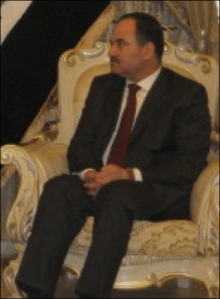Rafi al-Issawi
| Rafi Hiyad al-Issawi | |
|---|---|
 | |
| Minister of Finance | |
|
In office 22 December 2010 – 1 March 2012 | |
| Prime Minister | Nouri al-Maliki |
| Preceded by | Baqir Jabr al-Zubeidi |
| Succeeded by | TBD |
| Deputy Prime Minister of Iraq | |
|
In office 19 July 2008 – 22 December 2010 | |
| Prime Minister | Nouri al-Maliki |
| Preceded by | Salam al-Zobaie |
| Succeeded by |
Saleh al-Mutlaq Hussein al-Shahristani |
| Personal details | |
| Born |
March 2, 1966 Anbar, Iraq |
| Political party | National Future Gathering |
| Religion | Sunni Islam |
Rafi Hiyad al-Issawi (born 2 March 1966) is an Iraqi politician who is a former finance minister and deputy prime minister. A doctor by profession, he is the fourth most senior politician from the Sunni Arab minority after former Vice President Tariq al-Hashemi, Deputy Prime Minister Saleh al-Mutlak and Speaker of the Iraqi Parliament, Usama al-Nujayfi.
Early life and education
Issawi was born in Anbar in 1966.[1][2] He comes from the Albu Issa tribe.[1] This tribe is the dominant tribe in an area of around 80 square kilometers south of the city of Fallujah, in the western province of Al-Anbar.[3]
He trained as an orthopedic surgeon in Baghdad and Basra, before becoming the head of the Fallujah hospital. He was in that role during the Second Battle of Fallujah in November 2004 and he reported that 800 local Iraqis had died as a result of the attack.[4] He accused the United States Army of blocking a team of eleven Iraqi ministry of health ambulances with 20 doctors from evacuating the dead and injured or helping the injured.[5] A few months earlier he had accused the US Army of "constantly attacking ambulances", saying that an ambulance driver had been killed in a September 2004 bombing aimed at the leader of Al-Qaeda in Iraq, Abu Musab al-Zarqawi.[6]
Political career
Following the December 2005 election and six months of negotiations, a "government of national unity" was agreed between the four main coalitions, under the leadership of Prime Minister Nouri al-Maliki. Issawi, a member of the Iraqi Islamic Party which was part of the main Sunni Arab Iraqi Accordance Front colaition, became minister of state for foreign affairs from 20 May 2006. He withdrew from the government with four other ministers from the Front on 1 August 2007, demanding that the government of Nouri al-Maliki take stronger action against Shi'ite militias.[7] The Front rejoined the government on 19 July 2008 and Issawi was approved as deputy prime minister.[8]
Prior to the 2010 elections, he formed his own party, the National Future Gathering, which joined the Iraqiyya coalition. He became the Finance Minister in the Al Maliki II Government which was formed on 22 December 2010 after nine months of negotiations.
In December 2011, he started a boycott the cabinet, along with all but four of the other Iraqiyya ministers. An adviser to the Prime Minister said Issawi had been linked to al Qaeda in Iraq, although the Americans in 2010 had said that a thorough investigation of these allegations had determined that they were groundless. Issawi called for the resignation of Prime Minister Maliki, following the issuance of an arrest warrant for Vice President Tariq al-Hashemi, saying Maliki was trying to "build a dictatorship".[1]
Attacks
On 1 January 2012, Issawi was attacked by an improvised explosive device whilst driving. The attack wounded two of his security guards and was described as an "attempted assassination".[9] On 19 December 2012, he reported that nearly 150 of his guards and staff members had been arrested.[10] He was also attacked on 13 January 2013.[11] A bomb was detonated near to his convoy. Issawi was not hurt in attack that occurred while his convoy was heading to Fallujah to meet with tribal leaders.[11]
References
- 1 2 3 A Moderate Official at Risk in a Fracturing Iraq, New York Times, 30 November 2011
- ↑ "Iraq approves a new DPM and nine ministers". Wikileaks. 22 July 2010. Retrieved 25 December 2013.
- ↑ Paramount sheikh of the Albu Issa survives assassination attempt, Long War Journal, 2 September 2009, Retrieved 1 January 2012
- ↑ New York Times Rewrites Fallujah History, Fairness and Accuracy in Reporting, 16 November 2004, Retrieved 20 July 2008
- ↑ Wounded in Al-Fallujah to be treated in other cities, Al-Sharqiyah, 21 November 2004, Retrieved 22 July 2008
- ↑ U.S. Bombs Al Zarqawi hideout in Iraq, Radio Free Europe, 16 September 2004, Retrieved 22 July 2008
- ↑ In Fallujah, donkeys tell a tale, Asia Times, 7 September 2007, Retrieved 20 July 2008
- ↑ Sunni Bloc Rejoins Iraqi Government After Year-Long Boycott, AHN, 20 July 2008, Retrieved 20 July 2008
- ↑ Essawi escapes assassination attempt north of Baghda, National Iraqi News Agency, 1 January 2012
- ↑ Gordon, Michael R. (21 December 2012). "Tensions Rise in Baghdad With Raid on Sunni Official". The New York Times.
- 1 2 "Bomb hits convoy of Iraq's Sunni finance minister after demonstrations by his backers". Fox News. AP. 13 January 2013. Retrieved 13 January 2013.
| Political offices | ||
|---|---|---|
| Preceded by Salam al-Zaubai |
Deputy Prime Minister of Iraq 2008–2010 |
Succeeded by Saleh al-Mutlak |
| Preceded by Baqir Jabr al-Zubeidi |
Minister of Finance of Iraq 2010–2012 |
Succeeded by TBD |